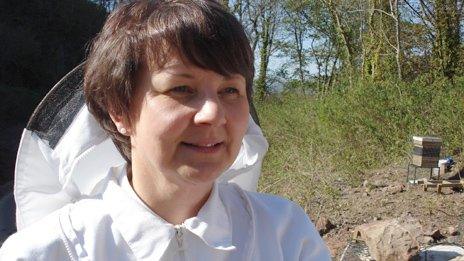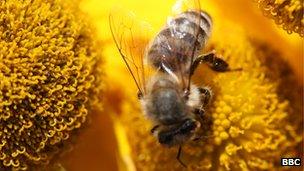Bee rustlers add to misery of struggling hive owners
- Published

Elaine Spence said the bee rustlers must have expert knowledge of hives
Bees have been battling bad weather, loss of habitat and possible pesticide effects but now keepers are facing a new threat - bee-rustling.
Cardiff beekeeper Elaine Spence found one her hives stripped of its honey bee colony in March.
She said she knows of 10 other hives being stolen in the past year by people who need expert knowledge to do it.
BBC Wales' Eye on Wales programme has found a number of hive theft cases although no officials figures are kept.
Ms Spence estimates a colony of bees could sell for more than £200.
She tells the the current affairs programme of her devastation to discover the theft of one of her colonies.
She said: "I looked at my hive and there was no roof on it. I was lost for words.

Honeybees are vital for pollinating crops - a job that would be very costly without them
"I lifted what remained of the hive to have a look and it was just empty inside.
"All bee-keepers strive to ensure that their bees last through the winter: you care for them, they're a bit like part of your family, really.
"And to come and find that they have just been taken from you - it was really distressing."
Ms Spence, who keeps her hives on industrial land at a secret location in Cardiff, had already lost one of her three colonies to the poor weather.
'Poetic justice'
She says she knows of around 10 other hives being stolen this year alone and said she believes the perpetrators knew what they were doing.
"We have small carrying boxes for bees which will take about six frames - I can only presume that they came equipped with one of those boxes.
"They lifted the six frames out of the hive complete with the colony on it, put them in the box, shut the box up, Bob's your uncle, away they go, and probably as quickly as that.
"To steal a colony of bees, you need to know what you're doing. A person walking the street would not know how to come in and effectively remove a colony of bees.
"The bees that were taken were a fairly angry lot - they even managed to put me in accident and emergency last year through stinging me, so maybe there might be some poetic justice."
The programme also explores the two-year ban just imposed by the European Commission on a group of pesticides known as neonicitoinoids.
Elaine Spence said she knows of 10 other hives being stolen in the past year by people who need expert knowledge to do it
James Byrne of the Wildlife Trust says he fears the pesticides could be eroding bees' navigation system.
Invasive mite
But Pembrokeshire arable farmer Perkin Evans, who is also the National Farmers' Union representative for Wales' arable farmers, tells the programme he fears the ban could see crop yields reduced by up to 20%.
Eye on Wales also follows regional bee inspector Francis Gellatly as he inspects for the invasive varroa mite and meets Newport bee-keeper Dave Crewe, who lost two of his finest colonies to the poor weather.
Eye on Wales was broadcast on BBC Radio Wales at 13:30 BST on Sunday 26 May and will be available on the BBC iPlayer.
- Published29 April 2013
- Published9 April 2013
- Published19 November 2012
- Published8 August 2011
- Published27 July 2012